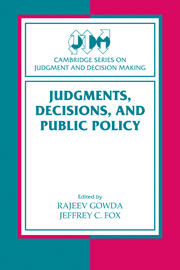Book contents
- Frontmatter
- Contents
- Contributors
- Acknowledgments
- Introduction
- Part I The Fundamentals of Behavioral Decision Theory
- Part II Economic Applications and Contrasts
- Part III Applications to Political and Legal Processes and Institutions
- Part IV Other Policy Applications
- 10 Enhancing the Effectiveness of Innovative Policy Instruments: The Implications of Behavioral Decision Theory for Right-to-Know Policies
- 11 Behavioral Perceptions and Policies Toward the Environment
- 12 The Affect Heuristic: Implications for Understanding and Managing Risk-Induced Stigma
- 13 Enlarging the Pie by Accepting Small Losses for Large Gains
- Part V Commentary and Cautionary Note
- Index
10 - Enhancing the Effectiveness of Innovative Policy Instruments: The Implications of Behavioral Decision Theory for Right-to-Know Policies
Published online by Cambridge University Press: 11 January 2010
- Frontmatter
- Contents
- Contributors
- Acknowledgments
- Introduction
- Part I The Fundamentals of Behavioral Decision Theory
- Part II Economic Applications and Contrasts
- Part III Applications to Political and Legal Processes and Institutions
- Part IV Other Policy Applications
- 10 Enhancing the Effectiveness of Innovative Policy Instruments: The Implications of Behavioral Decision Theory for Right-to-Know Policies
- 11 Behavioral Perceptions and Policies Toward the Environment
- 12 The Affect Heuristic: Implications for Understanding and Managing Risk-Induced Stigma
- 13 Enlarging the Pie by Accepting Small Losses for Large Gains
- Part V Commentary and Cautionary Note
- Index
Summary
Introduction
The turn of the millennium has provided an occasion for scholars to step back from the hurly-burly of policy action to indulge in historical assessments of progress in knowledge and to make prognostications on policy trends. In one such exercise, Paul Portney, the president of the influential think tank Resources for the Future, considered what might emerge in environmental policy during 2000–2050. After applauding the acceptance of economic incentives-based approaches such as emissions trading, Portney hailed the emergence of information provision as an instrument of environmental policy and predicted that programs utilizing this technique would soon proliferate.He suggested that
experience has shown that when firms are required to make public their emissions, they feel pressure to reduce them, even when the levels of emission are perfectly legal. … So long as citizens are able to make sense of this information, programs like this are not only democratic but also efficiency-enhancing.
(Portney, 2000, p. 201)The first sentence of the quote captures the essence of the information provision or right-to-know approach. Information provision is a remarkably simple policy instrument. Rather than trying to persuade citizens and firms toward some behavioral response, it merely mandates that information about risks be placed in the public domain. People and firms can then respond to this information in any manner they choose, though the expectation is that they will make better-informed decisions, particularly about risk management and self-protective behavior (Hadden, 1989). Information provision corrects a market failure – that of incomplete information.
- Type
- Chapter
- Information
- Judgments, Decisions, and Public Policy , pp. 243 - 264Publisher: Cambridge University PressPrint publication year: 2001

